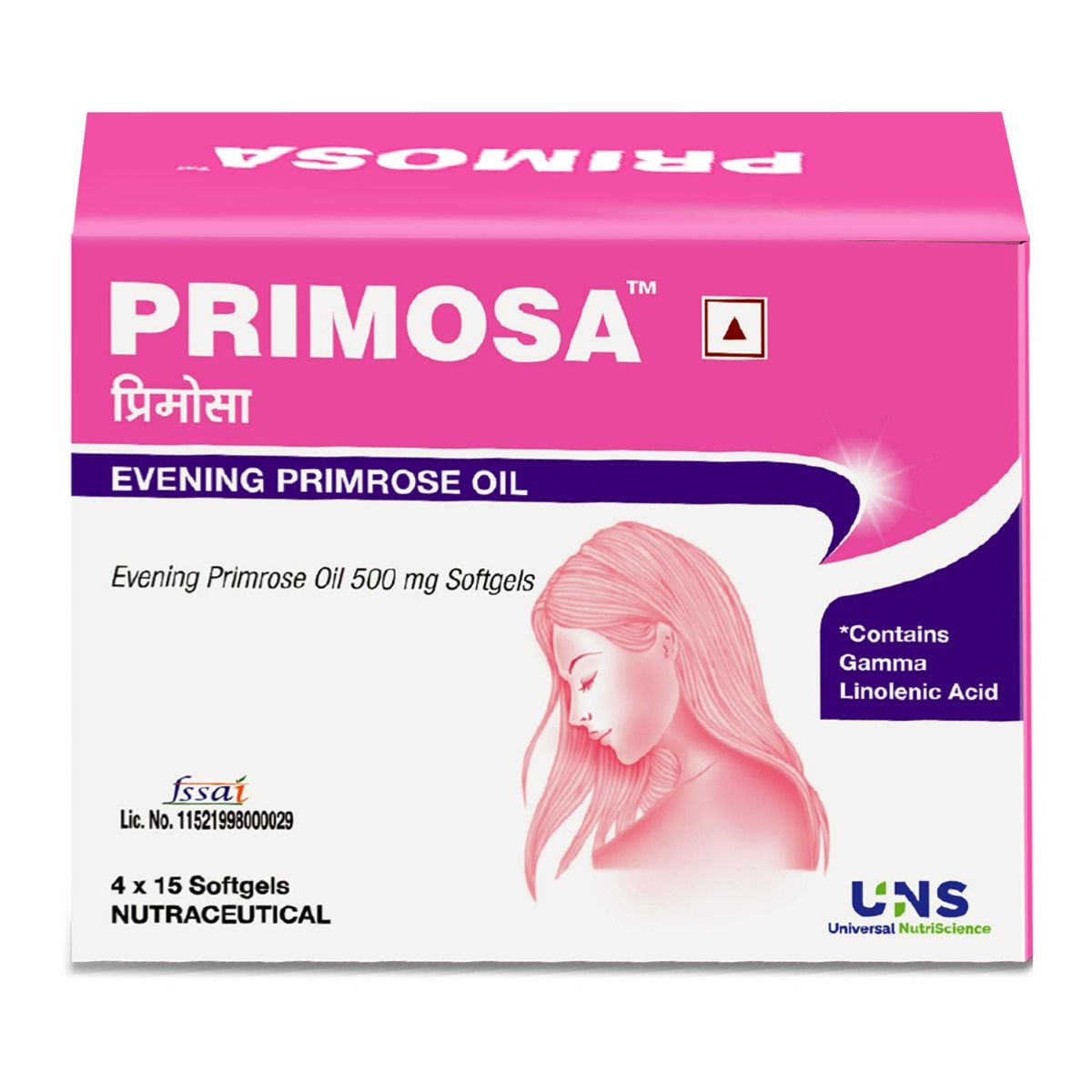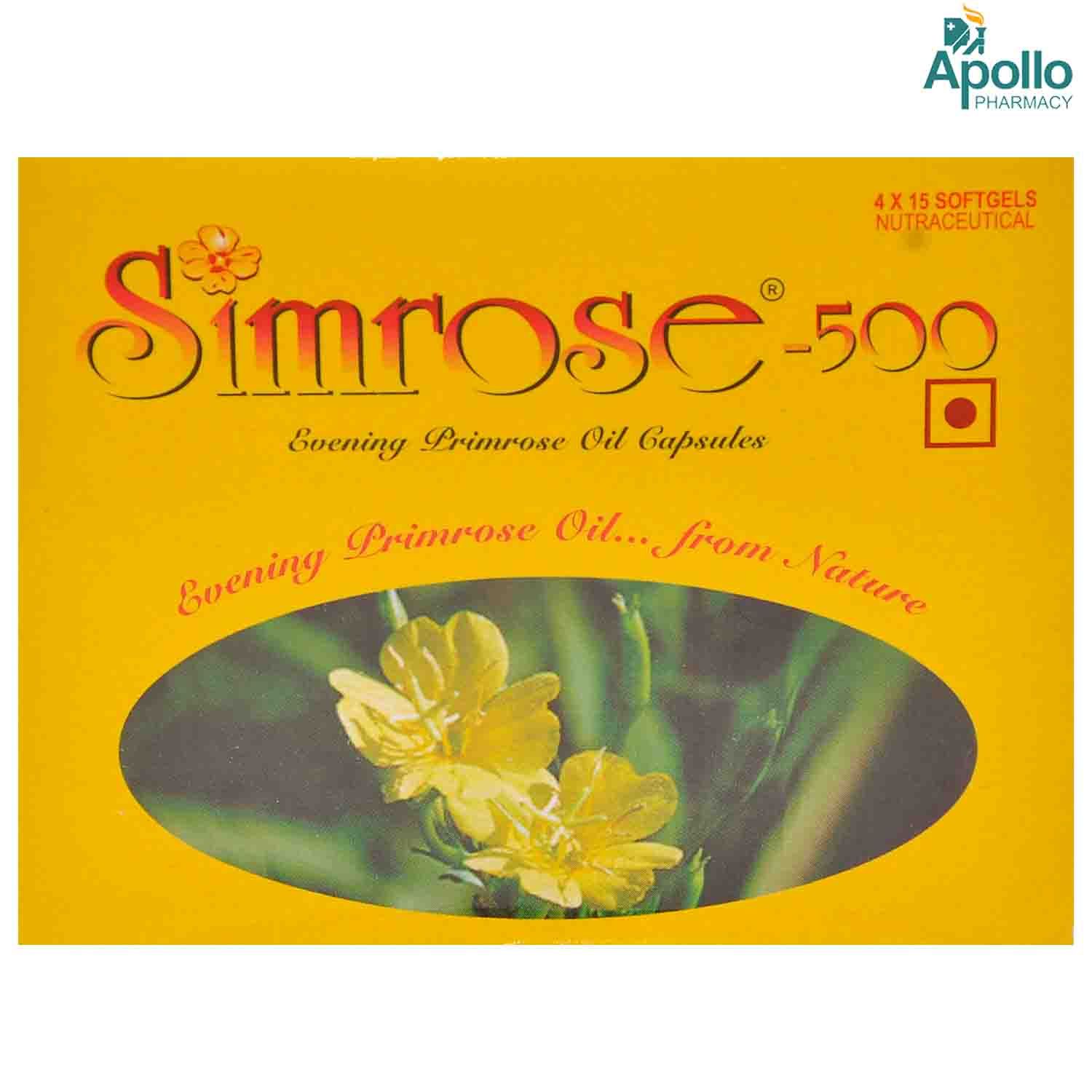Primrose Oil
About Primrose Oil
Primrose Oil is a 'Nutritional supplement' that helps to treat skin problems like acne and eczema. It also treats cyclical mastalgia (breast pain) and premenstrual syndrome symptoms (PMS) like irritability. Skin problems may occur due to a lack of essential fatty acids, which causes hormonal imbalance and may lead to skin problems like acne, eczema, rosacea, and allergies. On the other hand, mastalgia is breast pain related to the hormonal fluctuations associated with the cyclical, related to the menstrual cycle, or non-cyclical.
Primrose Oil contains Primrose oil. Primrose oil is extracted from the seed of the evening primrose oil It plays an important role in regulating hormones and promoting skin elasticity. Primrose oil works by reducing skin inflammation and the number of skin cells that cause lesions. It may also help the skin retain moisture, elasticity, firmness, and fatigue resistance.
Take Primrose Oil as recommended. This medicine may rarely cause side effects. However, some people may experience nausea, stomach upset, tiredness, and diarrhea. Most of these side effects of Primrose Oil do not require medical attention and gradually resolve over time. However, if the side effects persist or worsen, please consult your doctor.
Primrose Oil should be avoided if you're allergic to it. Consult your doctor before taking Primrose Oil if you are pregnant or breastfeeding. Before taking it, inform your doctor about your medication history, including any vitamins or herbal supplements. If you have a history of blood disorders, seizures (fits), liver disease, kidney disease, or heart problems, let your doctor know before taking Primrose Oil. Also, inform your doctor that you are taking Primrose Oil before surgery.
Uses of Primrose Oil
Medicinal Benefits
Primrose Oil contains nutritional supplements, namely, Primrose oil. Primrose oil, extracted from the seed of the evening primrose oil, contains gamma-linoleic acid (GLA), linoleic acid (LA), and omega-6 fatty acids, which play an important role in regulating hormones that promotes skin elasticity. Primrose oil works by reducing skin inflammation and the number of skin cells that cause lesions. It may also help the skin retain moisture, elasticity, firmness, and fatigue resistance and improve its epidermis. It is highly effective in treating premenstrual syndrome (PMS) symptoms such as irritability and bloating. Also, reduce inflammation and help inhibit prostaglandins that cause cyclical breast pain. Altogether, Primrose Oil treats skin problems like acne, eczema, and cyclical mastalgia (breast pain).
Directions for Use
Storage
Side Effects of Primrose Oil
Upset stomach
- Nausea
- Headache
- Diarrhoea
- Tiredness
Drug Warnings
Avoid taking Primrose Oil if you are allergic to it. Inform your doctor if you are pregnant or a nursing mother. If you have a history of blood disorders, seizures (fits), liver disease, kidney disease, or heart problems, please inform your doctor before taking Primrose Oil. If you take any medicines or supplements, talk to your doctor before using the Primrose Oil. Avoid using this medicine in children unless recommended by your doctor. You should inform your doctor that you are taking Primrose Oil before surgery.
Drug Interactions
Drug-Drug Interactions: No interactions found & established.
Drug-Food Interactions: No interactions found & established.
Drug-Disease Interactions: Before using Primrose Oil, let your doctor know if you have a bleeding or blood clotting disorder, seizures (fits), liver or kidney, or heart diseases.
Drug-Drug Interactions Checker List:
Safety Advice

Alcohol
safeNo interactions were found or established.

Pregnancy
cautionOnly limited information is available on the effects of Primrose Oil on pregnancy. Please consult your doctor before taking Primrose Oil if you are pregnant or planning to conceive. Your doctor will recommend only if the benefits outweigh the risks.

Breast Feeding
cautionIt is not known whether Primrose Oil passes through breast milk. Hence, consult your doctor before taking Primrose Oil if you are breastfeeding. Your doctor will recommend only if the benefits outweigh the risks.

Driving
safePrimrose Oil does not affect your ability to drive.

Liver
cautionPlease consult your doctor before taking Primrose Oil if you have any liver problems.

Kidney
cautionPlease consult your doctor before taking Primrose Oil if you have any kidney problems.

Children
cautionIt is not known whether Primrose Oil can be used in children. Hence, please consult your doctor for more information.
Habit Forming
Diet & Lifestyle Advise
Consume an adequate amount of protein. Dietary protein provides essential amino acids that your body can not make independently and must be consumed daily to maintain muscle, bone, and skin health.
Exercise regularly, and maintain a healthy lifestyle. Physical activity can strongly influence hormonal health.
Use mild soap while taking baths and prefer warm baths.
Avoid harsh products on your skin.
Do not scratch or pick your skin to avoid getting the affected area infected.
Manage stress, eat healthily, drink plenty of water, exercise regularly, and get plenty of sleep.
Avoid or limit the intake of alcohol and caffeine.
Special Advise
Patients Concern
Disease/Condition Glossary
Mastalgia: Mastalgia (breast pain) is related to the hormonal variations associated with the cyclical and related to the menstrual cycle, or non-cyclical. Normal fibrocystic changes can cause breast pain, swelling, or thick areas. Symptoms include breast tenderness, sharp, burning pain, and tightness in the breast tissue.
Hormonal Imbalance: Hormones are chemicals that are produced by glands (endocrine system) in the body. An imbalance occurs when there is too much or too little of a hormone in the body. It can be caused by stress or hormone medications. However, hormonal imbalances can also be caused by any medical condition that impacts or involves the endocrine system or glands. Symptoms of hormonal imbalance include unexplained weight gain or weight loss, changes in sensitivity to cold and heat, dehydrated skin or skin rashes, brittle or weak bones, changes in blood sugar concentration, breast tenderness, etc.
Acne vulgaris: Acne vulgaris (acne) is a skin condition caused by plugging hair follicles with oil and dead skin cells. Whiteheads, blackheads, pimples, cysts, and nodules are all types of acne. It commonly occurs in teenagers though all age groups are affected.
Eczema: Eczema is a condition in which skin patches become inflamed, itchy, cracked, and rough.
FAQs
Primrose Oil is used to treat skin problems like acne and eczema. It also treats cyclical mastalgia (breast pain) and premenstrual syndrome symptoms (PMS) like irritability.
Primrose Oil contains Primrose oil which plays an important role in regulating hormones and promoting skin elasticity.
In some patients, a blood thinner, when taken along with Primrose Oil, may increase the time required to form blood clots. Hence, before starting Primrose Oil, inform your doctor if you are taking any blood thinner.
Unless suggested by the doctor whether to take Primrose Oil in the morning or night, one should fix a time slot, and they should take it regularly at the same time.






